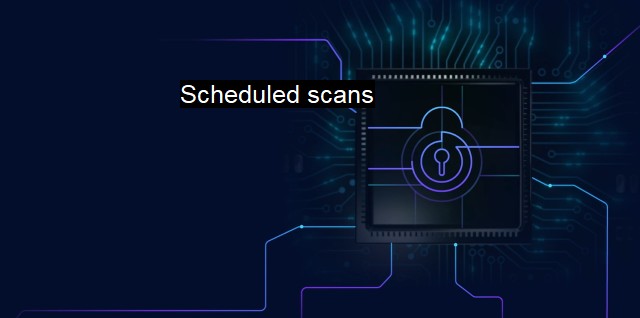What are Scheduled scans?
Defining the Necessity of Scheduled Scans in Cybersecurity and Antivirus: The Proactive Measure Against Evolving Threats"
"Scheduled Scans" is an essential feature that plays a pivotal role in ensuring optimum protection against potential threats. It is the process in which your antivirus software automatically carries out a complete or partial scan of your computer system according to a predefined schedule.Antivirus software is specifically designed to identify, neutralize, or eradicate threats to our devices and the data stored within them. These threats could come in various forms such as viruses, malware, trojans, ransomware, and spyware, amongst others. One effective way antivirus software accomplishes its task is through system scans. These scans delve into and analyze the files, applications, and systems within our devices to detect any suspicious or malicious activity.
Scheduled Scans, as the name suggests, involves automatically conducting these scans at predetermined times. The user usually sets the frequency and the timing of these scans. It could be daily, weekly, or even monthly. users have the flexibility to select particular files, documents, systems, or complete devices for these scheduled scans. Therefore, it gives the user considerable control over maintaining device health.
Scheduling scans are advantageous as it allows the scanning process to run in the background without active user involvement freeing up user time without compromising security. It serves two main functions- proactively detecting potential threats to prevent any damage, and dynamically uncovering existing threats within the system. With the pervasiveness of Internet usage and extensive data exchange, our devices are under constant threat. Hence, regular scanning is absolutely necessary since newer and more sophisticated forms of malware are frequently released.
The unlock of potential threats during Scheduled Scans allows your antivirus software to then take necessary actions against identified problems. This action could vary from simply notifying the user about potential risks, putting suspicious files in quarantine to restrict their operations, deleting risky files, or guiding the user on steps to mitigate the threat.
Importantly, comprehensive scheduled scans can be somewhat resource-intensive. They may affect the computer's performance by slowing it down. scheduling these scans for times of low activity such as during the night can help avoid major performance issues and ensure you experience a more efficient and streamlined operation during active hours. Also, the best antiviruses now come equipped with smarter resource allocation, meaning they work transparently in the background when your computer is idle.
In the end, Scheduled Scans are integral to antivirus software and effectively maintaining system health. They offer a balance between protection against cyber threats and system performance. Scheduling scans ensure that your device stays protected without compromising on your working comfort or system performance.
Even though Scheduled Scans substantially assist in securing your data from tricks, it is unwise to be completely reliant on this feature for your cyber protection. Users must remember that this is only a part of a robust cybersecurity strategy, not the entirety of it. Safe browsing habits, multi-factor authentication, regular system updates, real-time protection, secure network practices are amongst many other ways that can additionally safeguard your data. This comprehensive approach can further fortify your defense strategy against the ever-evolving world of cybersecurity threats.
"Scheduled Scans" are an automatic, routine, and often underappreciated feature that enhances the tools at our disposal to ensure a secure digital environment for our data and systems. As part of a broader cybersecurity strategy, and when paired with other recommended practices, they can significantly enhance your chances of staying safe in an increasingly interconnected and digital world.

Scheduled scans FAQs
What is a scheduled scan?
A scheduled scan is an automated scan that runs at a specified time or frequency to check for potential security threats and vulnerabilities on a computer system. It is one of the essential features of modern antivirus software that helps to protect against malware, spyware, and other cyber threats.How do I schedule a scan in my antivirus program?
The process of scheduling a scan varies depending on the antivirus software you are using, but it generally involves accessing the program's settings or preferences menu. Look for an option that allows you to schedule a scan and set the desired frequency and time. You can usually choose between daily, weekly, or monthly scans.What are the benefits of a scheduled scan?
Scheduled scans are an essential component of computer security because they help to detect and remove threats before they can cause damage. By running a scan at a particular time or on a regular basis, you can ensure that your system is always checked for potential threats. Additionally, scheduled scans allow you to free up your time and resources since you don't have to manually run a scan every time you want to check your system for malware.What should I do if a scheduled scan detects a threat?
If your scheduled scan detects a threat, you should take appropriate action to remove it as soon as possible. This may involve quarantining or deleting the infected files, updating your antivirus software, or seeking further assistance from a cybersecurity professional. Once the threat is removed, it's important to rescan the system to ensure that all threats have been eliminated.| | A | | | B | | | C | | | D | | | E | | | F | | | G | | | H | | | I | | | J | | | K | | | L | | | M | |
| | N | | | O | | | P | | | Q | | | R | | | S | | | T | | | U | | | V | | | W | | | X | | | Y | | | Z | |
| | 1 | | | 2 | | | 3 | | | 4 | | | 7 | | | 8 | | |||||||